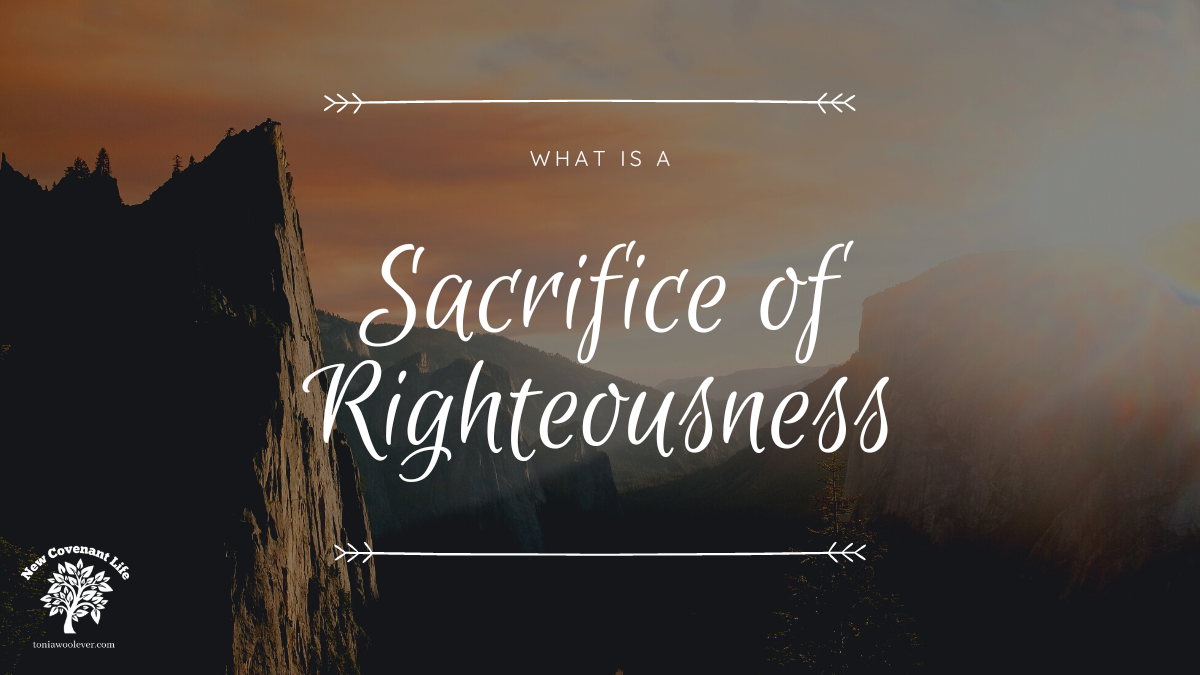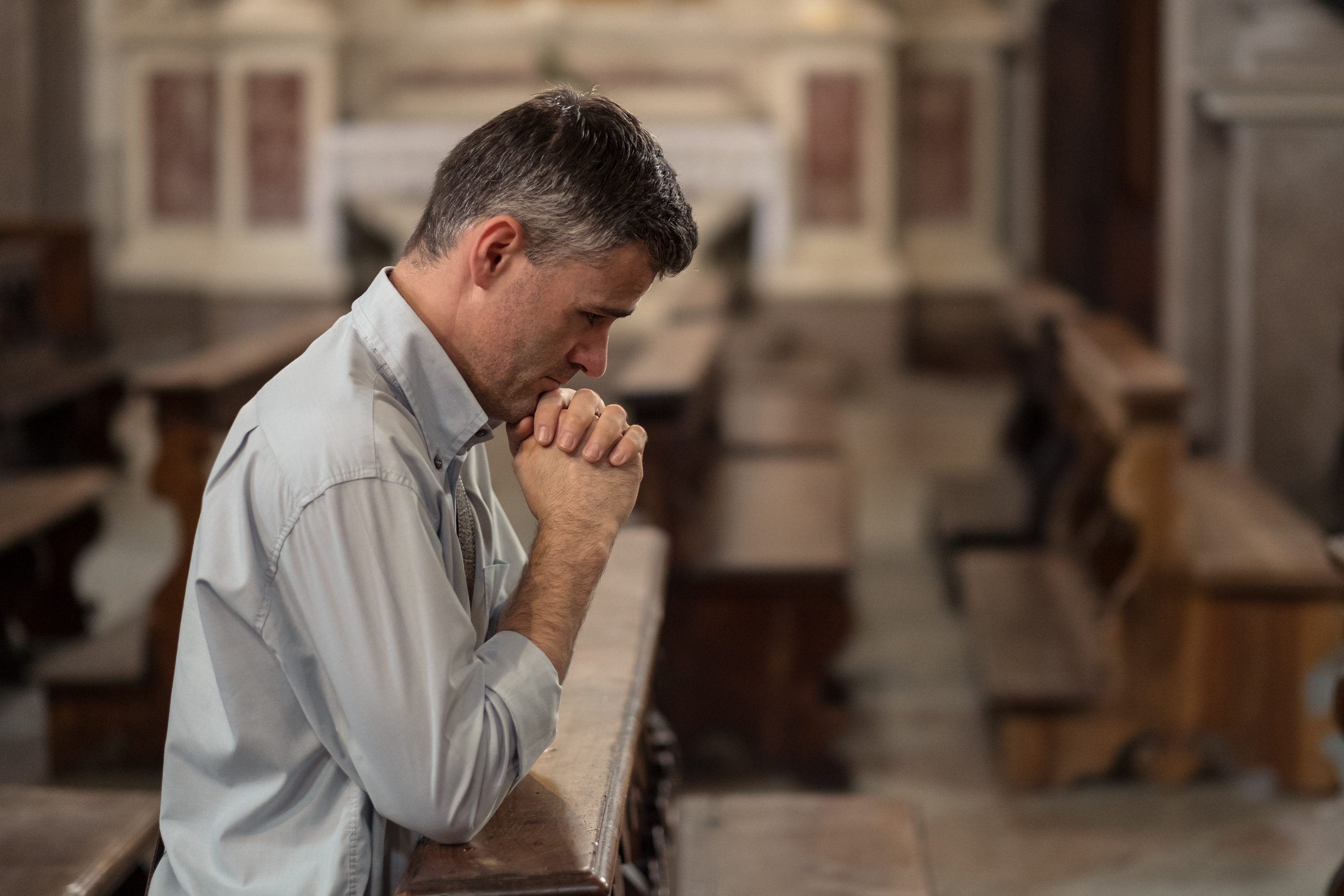
Offer the sacrifices of righteousness, and trust in the Lord
Psalm 4:5
There are times when a Bible verse grabs hold of you and won’t let go. You just can’t read past it, even if you’ve done so many times before.
That’s the Holy Spirit, your personal helper in all things concerning walking with God, saying, “Let’s park here for awhile; I have some things to teach you.” What follows is what the Spirit taught me when He pulled me aside for our lesson on sacrifices of righteousness.
This phrase is easily overlooked in presumption — what we assume it means. It needs to be rescued from the fog of familiarity and brought into the clear light of God’s intention. The Spirit is passionate to reveal God’s life-giving truth in His Word, help us discard our religious baggage and see the heart of God.
Most of us instinctively shrink back from sacrifice.
Sometimes we stall in order calculate the cost before we yield up anything, even to God. I speak from experience.
In this case, when the Spirit revealed His truth, He really messed with my calculation, which usually ended up with a version of “If I do this, God wins, and I lose, but it’s right for God to win.” But a sacrifice of righteousness, I’ve learned, ultimately becomes a gift. Sacrifice comes with its own sweet reward, which in God’s kingdom, is always significant. Over time, God’s rewards just keep bearing fruit and blessing you. You cannot calculate that, you can only enjoy it. But I’ve told you the end of the matter, and you need the rest of the lesson.
First, what is righteousness?
Righteousness happens when we do the right thing, with the right person, for the right reason, at the right time. Yeah, that’s a lot. Thank God for His Spirit directing us towards all of these, in perfect concert.

Where sacrifice is concerned, Today is the day that counts.
Regardless of how much I’ve offered God in past days, Today is the right day to offer Him my gifts of gratitude, praise, affection, and obedience. And if I’m not having a good day, those gifts take on the nature of a sacrifice, like:
- Letting go of what I want to do in order to follow my Jesus, whom I claim to love.
- Turning away from self-concern.
- Giving up the weirdly satisfying sensation of feeling sorry for myself.
- If I’m in deep grief over a loss, offering that to the Lord and affirming that He is good, and worthy of the deepest parts of my heart.
A sacrifice requires us to release something we want to hold onto — something which matters. A sacrifice will cost something.

Where timing is concerned, the Today rule is just as true of our personal relationships. My spouse, children and friends love and care for me generally, but sometimes I need something from them Today, regardless of how much they’ve loved me in our history together. Likewise, they will often need things from me that are inconvenient.
Not to mention that sometimes, people need things from me that, in my view, are undeserved. Frankly, none of us are “worthy” of the sacrifices of others. God is always worthy of them, of course, and Jesus told us to do all things as if unto the Lord himself. The Spirit set me straight on that one a long time ago, and has never budged off of His position.
All sacrifice is relational.
It is easy to view a sacrifice only in light of ourselves; but all sacrifice is relational.
God isn’t impressed by sacrifices offered for the sake of showing how strong or obedient or righteous we are. Which is why Jesus affirmed that every sacrifice we do in secret is especially noticed, and rewarded, by the Father. Any sacrifice God requires of you is because it is the right thing to happen between you and another — whether that other is Himself or souls you know.
A sacrifice of righteousness is the right thing offered at the right time — for me, for God, for another, in a certain situation.
What, in God’s eyes, is the point of doing the right thing?
I’ve come to believe God’s goal in relationship is simple: to nurture life
Whatever nurtures life in another, is the right thing. Giving life is God’s passion and His glory.
All relationships are nurtured through giving to the other. Generosity refreshes the spirit of the receiver, and affirms your value for the person and the relationship. That is the whole point of worshiping God — worship demonstrates God’s worth in your eyes.
We don’t give to God because He needs our gifts, but because it is the right thing to do. Our God is generous. He is teaching us to be like Him, first towards Him, then towards our fellow man.
Our hearts are hungry.
And God’s heart is, well, God-sized. Not just because He’s God, but because His heart is connected to all His creation, whose needs and hungers are known to God. When God wants something from me, He often wants it on behalf of another who needs it.
Furthermore, this Living Soul, My Redeemer, is hungry for something from me, not because He needs it; but because He desires the fruit that will come from his kingdom law — the “give and it will be given to you, pressed down, shaken together and running over” principle.
It was this law of God’s heart that Paul alluded to when he wrote to the church at Philippi:
… when I was in Thessalonica, you sent me aid more than once when I was in need. Not that I desire your gifts; what I desire is that more be credited to your account. I have received full payment and have more than enough. I am amply supplied, now that I have received from Epaphroditus the gifts you sent. They are a fragrant offering, an acceptable sacrifice, pleasing to God. And my God will meet all your needs according to the riches of his glory in Christ Jesus.
Philippians 4:16-19 (NIV)
The riches of his glory….
God is rich, possessing all things. So why does He desire my sacrifice? In a word, joy.
God receives joy in pouring His riches out on His children. This is part of his glory! It gave Him joy to give you His son Jesus, to be your Savior. God gave Jesus to you because of the joy it would give Him in saving you and joining you to his heart. Jesus sacrificed His life “for the joy set before him” — the joy he would experience in making that possible for the Father.
Your God doesn’t just want to enrich you; He wants you to experience the joy that rewards a generous heart, and that becomes the enduring atmosphere of relationship done right. It is the gift that keeps on giving.
Your altar of sacrifice is actually a place of exchange.
Thanks to Jesus, your altar is not a bloody stone. It is your meeting place, where you exchange your futile efforts to give yourself life, for His life flowing to you.
When the Spirit opened my understanding about a sacrifices of righteousness, I understood that what God requires as a sacrifice from me is actually something that stands in the way of the greater life He offers.
Doing the right thing is not just you giving up things for the sake of acting righteous. God doesn’t demand it in order to prove your self-less-ness. Righteousness brings a two-sided blessing. It is always right for both of you — the one who gives it, and the one who receives it.
As you give God what is right for Him, God gives you what is right for you to have more life. When you give others what is right, you participate in the Father’s work of being life-giving to them. There will always be joy in that, a kind of sweet joy that you just can’t obtain any other way. And odds are that those you sacrifice for will go on to bless others for having been blessed. It is the ultimate circle of life.

What is the righteous offering God desires of me?
That could be so many things, and varies greatly from season to season, and relationship to relationship. I search my heart, and ponder the possibilities:
Perhaps things are not right between me and another person.
In this case, a sacrifice of righteousness to God would look like me doing whatever I must to make things right between us again. If we’ve had a conflict over an issue, my sacrifice begins with laying down my pride, humbling down, and listening to the other with an open mind — in case my confidence that I am right! — is wrong.
The sacrifice — the thing I die to and release — becomes complete when my hunger for righteousness in this relationship is greater than my desire to win. Letting God win, I win, they win, we all win. My prize is a lighter heart, free of emotional baggage and the work it took to stand my ground. Going forward, that reward expands in surprising ways, making my heart smile. My heart is occupied with peace instead of conniving and calculating. It becomes restful in there.
Maybe I have walked past someone in need.
I’ve been unwilling to sacrifice my time, or so focused on my agenda that I didn’t see another’s need. Or assumed their need was someone else’s problem. I might have even judged that they brought the problem on themselves, and therefore, didn’t deserve my help.
In one of these scenarios, my sacrifice would be to lay down self-absorption, posturing, prejudice or judgment, and just go serve the needy one, as if they were Jesus. After all, He said we would always find Him with such people; that anything we do for the least of these, we do for Him.
By the way… the least of these isn’t just a term for the least fortunate person you know; it includes anyone you have personally deemed unworthy of your kind attention, for whatever reason.
It is always possible that what the Lord needs from you is to treat Him better.
In the momentum of self, have I left God behind somehow?
If so — and it happens so quietly, so easily, in light of His graciousness — I need to surrender my agenda up to Him in order to restore the right thing between the Lord and me. This sacrifice begins with a heart check:
- In that secret place shared only with the Lord, what has been filling my thoughts, my preoccupations, to His neglect?
- Am I entertaining doubts about God’s faithfulness?
- Imagining how to wrestle justice out of someone who has wronged me?
- Have I let hopelessness or resentment or self-pity creep in and silence my praise?
- Have I failed to obey something I know the Spirit is leading me to do?
- Are my passions flowing everywhere but to the Lord, who deserves them most of all?

The Spirit taught me to look away from what drives me, however needful or noble it may be, and look instead into the face of the One who loves me best, and ask,
Lord, how can I love you best in this moment?
This is the question that clears the fog of war within my mind and heart. The greatest command is simple and unequivocal: to love God with all my might. When your issues are confusing and the way is unclear, this is the touchstone, the nature of the altar of sacrifice between you and Jesus. Loving Him more than anything.
I ask the question, and I wait. The answer never fails to come. However, having an answer always leads to one more step, as least for me. Asking the Spirit to help me carry out the sacrifice needed to validate that I choose to love God with all my might. To show me what that looks like here and now. The what is often profoundly simple; the help always comes. Spirit loves to help you do what is right.
If God desires a sacrifice of my stuff, it isn’t a punishment.
It’s an act of passion; He is jealous over whatever my heart loves or is consumed by.
Many years ago I became passionate about sewing. I took one side of our spare bedroom — which I used for my morning devotional and study with the Lord, and created a special area for sewing. It gave me joy to plan and craft and create lovely things, and gradually, I began to neglect other things for sewing — including the measure of my devotion to God.
One day, I completed sewing a certain dress, and feeling great pride in it, when a dark feeling of guilt and conviction swept over me. I knew I had offended God. I asked the Lord how to make it right. He told me to cut up the dress and throw it away.
I wrestled with that for a bit, which reveals how much the work of my hands mattered to me. I did make the choice to destroy the dress. I was crying, and grieving, to frankly, I wasn’t clear how much grief was on account of God and how much on account of saying goodbye to the dress I had made.
I picked up the scissors to proceed, but as I was about to cut it apart, the Spirit said, “Stop. First, go confess this to your husband.” I was ashamed to have to face my pastor husband with this, but I took the scissors and the dress to him.
My loving and wise husband held me while I cried and confessed. He did not shame me, but affirmed that it was good for me to lay down anything I was devoted to more than God. There is something about confession, saying it all out loud to another, that brings you to a fuller sense of your sin or failing.
As my husband prayed over me while I went through this, all grief over the dress disappeared, as I sensed the Lord’s deep disappointment in me. My grief became all for Him, the Lord I claimed to love with all my heart. I asked for, and received God’s forgiveness, and asked Him to cleanse me. I made a fresh commitment to love God above all things.
Then, to complete it all, I reached for the scissors and the dress, but Ron stayed my hand. “Honey, you need to ask God if He still wants you to destroy this dress. You are 100% ready to obey; you have given it up for Him. Pray and see what the Spirit says.”
I was really surprised. Could the Lord have changed His mind? I thought of Abraham. God did not change his mind about the sacrifice of Isaac, because he never intended for Abraham to kill his son, the son of promise. He was testing Abraham to see what he would do. Had I passed a test, also?
I left the dress and the scissors with my husband, put everything in the sewing room away, and purposed to leave it all alone until I had clear direction from the Lord. The next morning, as I worshiped the Lord and read His word, He affirmed his jealousy over my heart’s affections. His goal was not to punish me, but for me to return to Him with all my heart. I had done that. I was free to keep the dress if I wanted.
The graciousness of God was on full display. Restoring me to freedom was a sign of the totality of God’s forgiveness — and his confidence in the depth of my repentance. Freedom is always a test — the only honest means to measure the sincerity of our love.
As it turned out, all pleasure in that dress was gone. I put it on once, but it only reminded me of how I had hurt God’s heart. I gave it to Goodwill, praying over it, that the woman who bought it would grow hungry to seek Jesus.
If things aren’t quite right between you and God
A sacrifice of righteousness begins with taking any thoughts captive that are not consistent with loving God. Faithfulness begins in the mind. Lay down your doubts about God. Honestly acknowledge whatever or whoever you are more devoted to, than Him. Ask the Spirit to strengthen and help you.
If your heart is possessed by a passion for justice in a matter, lay your hunger for justice on His altar. You are never asked die to your need for justice, but you are asked to surrender your passion to obtain justice for yourself. Release the matter back into the hands of God, where it is safe, because He is the One who has promised to look after justice on your behalf.
Your sacrifice is made complete when you are no longer captivated by that thing. When your heart is free again to do the right thing — to worship God. To meditate instead on what is right, lovely and true of your gracious God, who sacrificed everything for you. Free set your affections on God, so that loving Him with all your heart, mind, soul and strength becomes true.
By such sacrifices of righteousness, the Lord’s goodness and faithfulness is acknowledged and rewarded with your hope, gratitude and trust. He is restored to His rightful place as your Justice-giver.
…And trust in the Lord.
David combines trust with his exhortation to offer the sacrifices of righteousness.
Trust, because sacrificing your desire for justice requires trust that God will honor His commitment to satisfy your need for justice.
Trust, because you will deny yourself to give aid to another, which might cost more than you think you can bear — especially if it means years of your life. Trust that the God who calls you to make the sacrifice will sustain you through it all.
Trust, because God promises to reward every sacrifice, to pay back in abundance whatever you give up for His sake and the sake of those you need to serve.
Trust, because hopelessness, resentment or self-pity may creep in if you have to wait for any of the above for very long.
God is worthy of all trust, and He responds to your trust with his whole heart. David described his trust in God often in his Psalms, and recorded God’s response. Note this conversation between David and God in Psalm 32:
David: You are my hiding place; you will protect me from trouble and surround me with songs of deliverance.
God: I will instruct you and teach you in the way you should go; I will counsel you with my loving eye on you. Do not be like the horse or the mule, which have no understanding but must be controlled by bit and bridle or they will not come to you. Many are the woes of the wicked, but the Lord’s unfailing love surrounds the one who trusts in him.
Psalm 32:7-10 (NIV)
Review: a sacrifice of righteousness is:
Laying down whatever hinders you from giving to God or others what is right — what you owe — what is due them. We belong to the God who is the embodiment of love, and asks us to imitate Him. Love for Him means never excusing ourselves by that worldly attitude which says of another, “I don’t owe them anything.” As Paul so elegantly pointed out, Let no debt remain outstanding except the continuing debt to love. (Romans 13:8)
When you let God tell you what your debts are, you have restored Him to His rightful position of Lordship in your heart. When you sacrifice to God whatever stands in the way of that, you exchange that thing for the great wealth of having a right heart in the eyes of God. On the path of sacrifice, you encounter the heart of God in ways not found by any other path. And what you encounter will stir new wonder and inspire new worship. The Apostle Paul walked that path, which led him to say, “I consider everything a loss because of the surpassing worth of knowing Christ Jesus my Lord, for whose sake I have lost all things.” (Philippians 3:8)
For Further Study:
Apostle Paul left some great Cliff Notes on what righteousness looks like in relationships in his letter to the church at Rome. Romans 12:1 through 15:12 — just three pages in your Bible.
3 COMMENTS
Leave A Comment
This site uses Akismet to reduce spam. Learn how your comment data is processed.








Norma Riscky | 17th Mar 23
Thank you so much for this article! It answered many unanswered questions that I often ponder! I so appreciate your simplicity and truthfulness!
Ezekial Chigudhu | 3rd Jun 23
This is well explained, thanks a lot for this teaching
Jumoke Odusami | 1st Feb 24
Thanks for a deeper insight into the full meaning of sacrifice of righteousness?